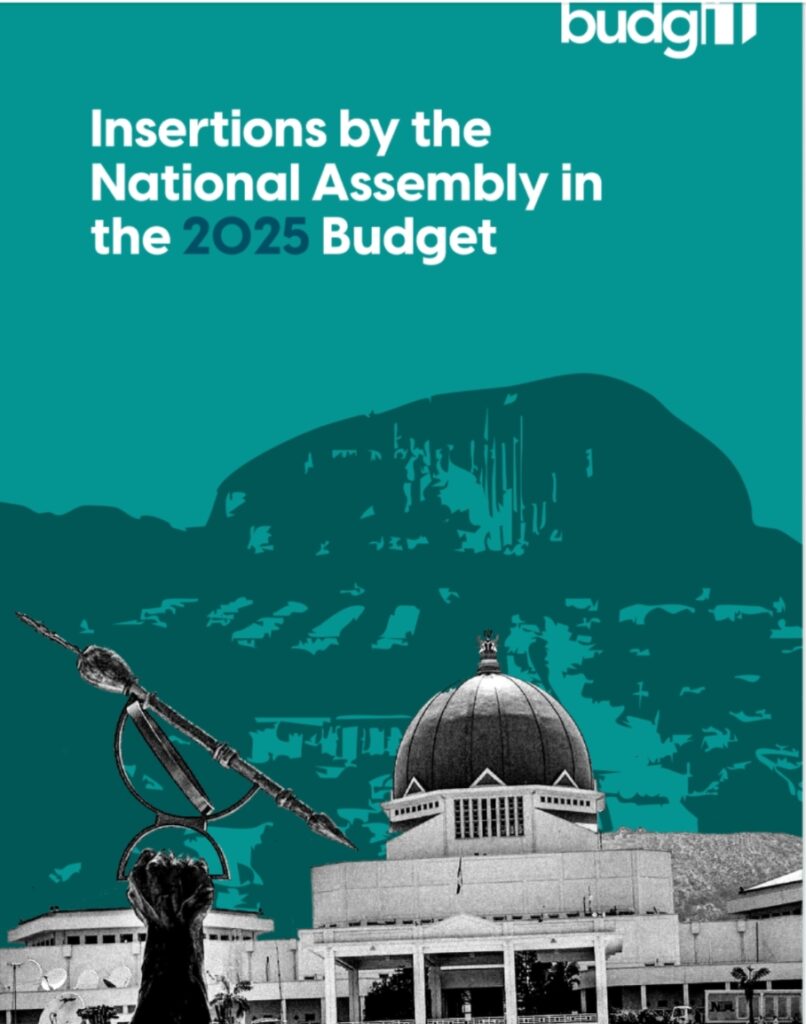… Over 11,000 Projects Inserted
Daud Olatunji
According to BudgIT, the civic technology organization, the 2025 federal budget has been rocked by a massive wave of insertions by the National Assembly, with no fewer than 11,122 projects worth a staggering N6.93 trillion pushed into the appropriation document.
PLATFORM TIMES reports that this figure represents nearly 13% of the total N54.99 trillion budget signed into law on February 28, 2025—N5.29 trillion higher than what was originally proposed by President Bola Ahmed Tinubu on December 18, 2024.
The BudgIT in its recent report made available on its X handle, the insertions which have drawn sharp criticism from budget analysts and transparency advocates, underscore a disturbing trend of fiscal manipulation that intensified under the 9th Assembly and appears to be accelerating under the 10th.
… Capital Supplementation,Mega Projects
A closer review of the 2025 Appropriation Act reveals that an additional N3.18 trillion was added to the capital supplementation segment, inflating the capital component of the budget from the proposed N14.85 trillion to N23.96 trillion.
According to the report, 11,122 projects were discreetly added by lawmakers, with 238 high-ticket projects valued above N5 billion each, cumulatively costing N2.29 trillion.
An additional 984 projects worth N1.71 trillion fall in the N1billion–N5 billion range, while 1,119 projects between N500 million and N1 billion were pegged at N641.38 billion.
Budget watchers say these mega projects were not initiated or designed by Ministries, Departments, and Agencies (MDAs), but rather arbitrarily inserted by lawmakers without feasibility studies, project appraisals, or alignment with national development plans.
…Frivolous And Misaligned Projects
Further scrutiny by BudgIT reveals that several projects inserted by lawmakers have no relevance to the core mandates of the agencies tasked with executing them.
For example, the National Centre for Agricultural Mechanisation in Ilorin is budgeted to construct and equip a 700-capacity ICT/CBT centre in Zonkwa, Kaduna South—a task far removed from its core responsibilities.
Similarly, MDAs like the Federal Co-Operative College in Oji River and the Nigerian Building and Road Research Institute are burdened with projects such as the procurement of security vehicles, street lights, youth empowerment tools, and distribution of fertilizers and outboard engines—projects typically beyond their technical scope.
These misalignments, experts argue, severely hamper project implementation and lead to widespread waste, with many interventions either poorly executed or abandoned entirely.
… Agriculture And Science Ministries Most Targeted
The Ministry of Agriculture and Food Security was disproportionately targeted in the insertion exercise. Of the total projects, 4,371—or 39%—valued at N1.72 trillion were routed through its budget, up from N242.5 billion in the executive proposal.
This follows a similar trend in the 2024 budget, where 2,470 projects were inserted in the agriculture ministry alone.
In 2025, the pattern deepened with another 1,777 projects worth N994.98 billion injected into the Ministry of Science, Technology, and Innovation.
Additionally, 90 projects valued at N1.1 trillion were allocated across several other MDAs.
… Fragmentation Of Budget And Localized Interests
Perhaps most telling is the hyper-fragmentation of capital spending, with a heavy tilt toward localised projects in federal constituencies and senatorial districts.
A breakdown shows 3,573 projects worth N653.19 billion directly targeted at federal constituencies and 1,972 projects costing N444.04 billion meant for senatorial zones. The insertions include:
1,477 streetlight projects (N393.29bn)
2,122 ICT projects (N505.79bn)
538 boreholes (N114.53bn)
319 health interventions (N420.09bn)
Empowerment of traditional rulers (N6.74bn)
BudgIT submits that most of these projects are not aligned with national infrastructure priorities and are often executed with little oversight, raising concerns about transparency, duplication, and political patronage.
… Who Benefits?
Analysts say the explosion of budget insertions reflects a growing use of public funds to serve narrow political ends. Projects are tailored to constituencies of powerful lawmakers or diverted to favoured MDAs that lack the technical expertise to deliver.
Agencies such as the Nigerian Building and Road Research Institute and Federal Co-Operative College, Oji River, have effectively become conduits for these projects.
“The pattern is clear: lawmakers are using the budget process to reward political allies and position themselves for future elections,” said one policy analyst, who declined to be named.
“It’s a distortion of national planning and a direct threat to service delivery.”
… Dissecting the Numbers
Total budget signed: N54.99 trillion
Executive proposal: N49.74 trillion
Capital budget increase: From N14.85 trillion to N23.96 trillion
Capital insertions by NASS: N6.93 trillion (11,122 projects)
Capital budget now inflated by: N9.11 trillion
Recurrent non-debt adjustment: N299.75 billion increase
Recurrent debt servicing: Slashed by N2 trillion
… The Accountability Gap
Critics warn that the scale of these insertions undermines fiscal discipline and national development goals. Many projects lack cost-benefit analyses, duplication checks, and sustainability plans.
In the long run, they say, Nigeria risks spending trillions on scattered projects with minimal socioeconomic return.
Calls for reform of the budget process, including a law to limit insertions and ensure transparency in the allocation of capital funds, are growing louder.
Do you want to share a story with us? Do you want to advertise with us? Do you need publicity for a product, service, or event? Contact us on WhatsApp +2348183319097 Email: platformtimes@gmail.com
We are committed to impactful investigative journalism for human interest and social justice. Your donation will help us tell more stories. Kindly donate any amount HERE




